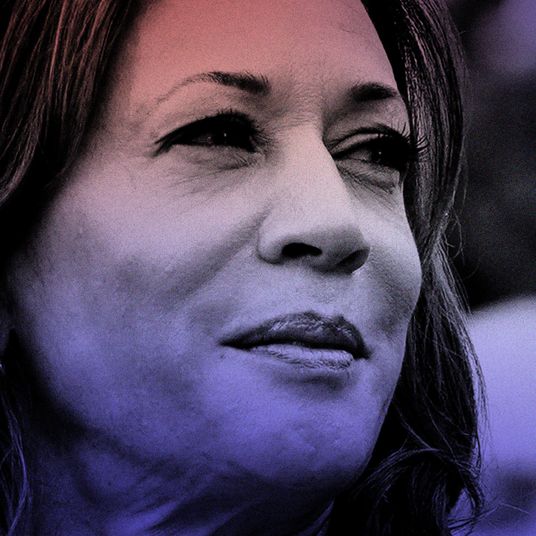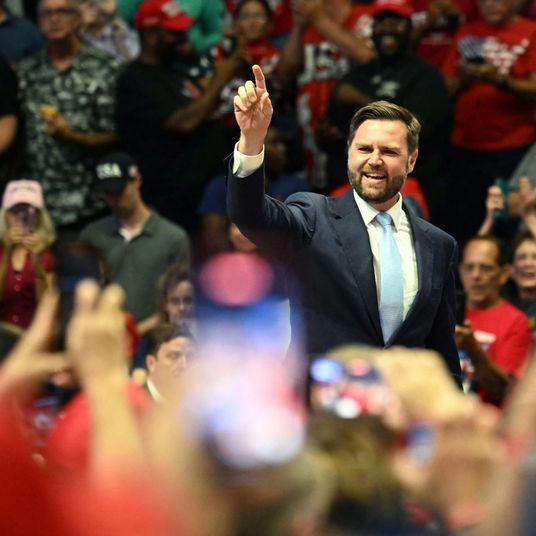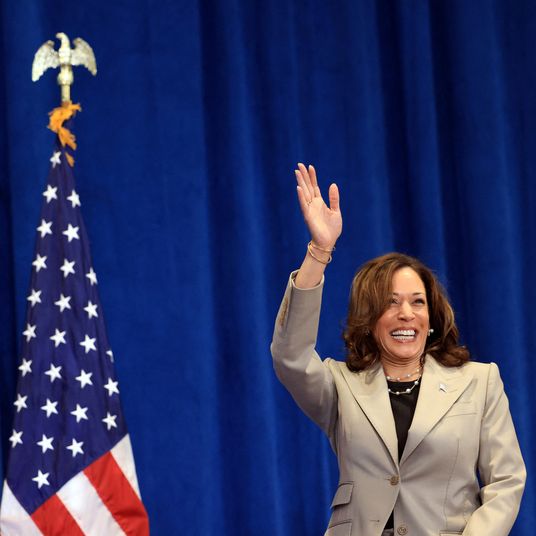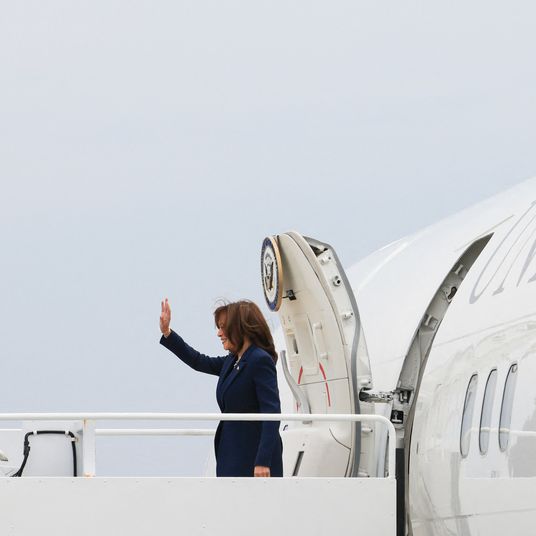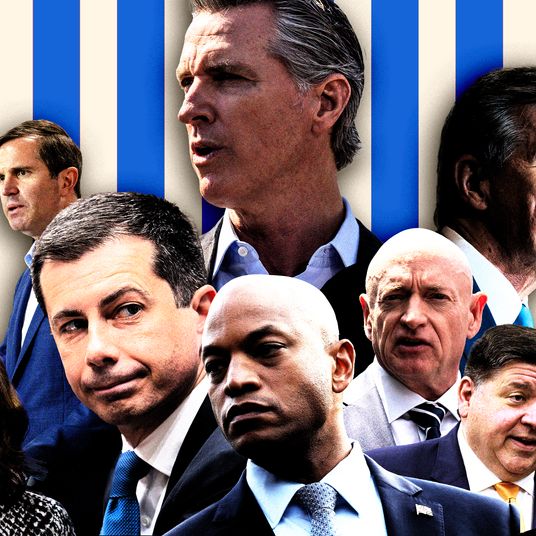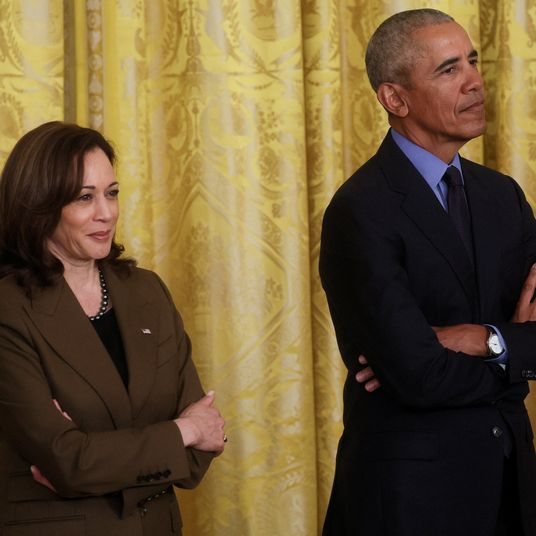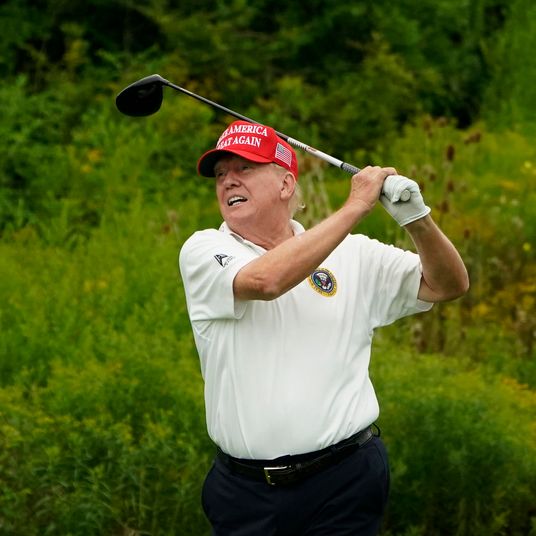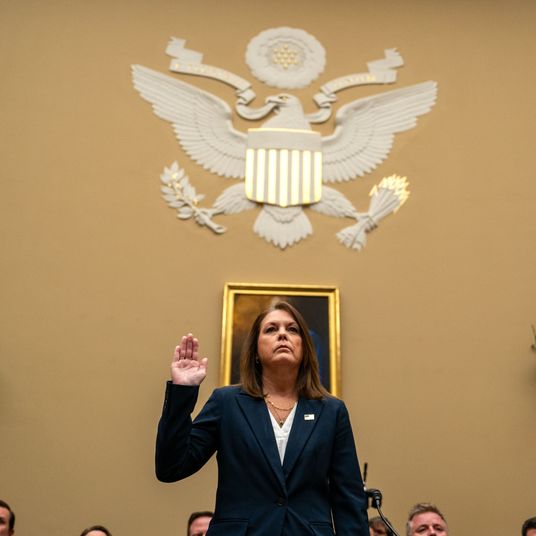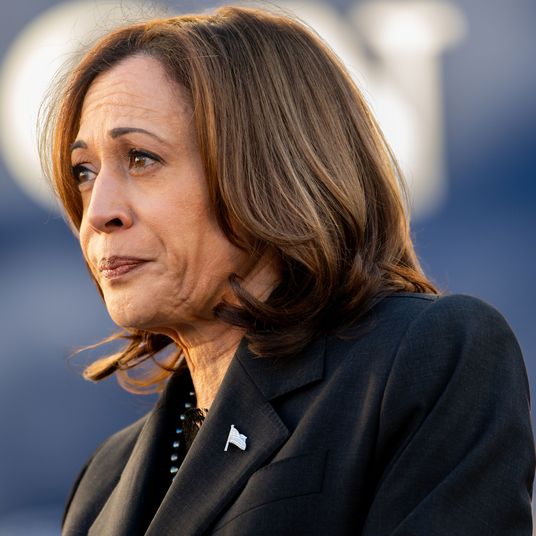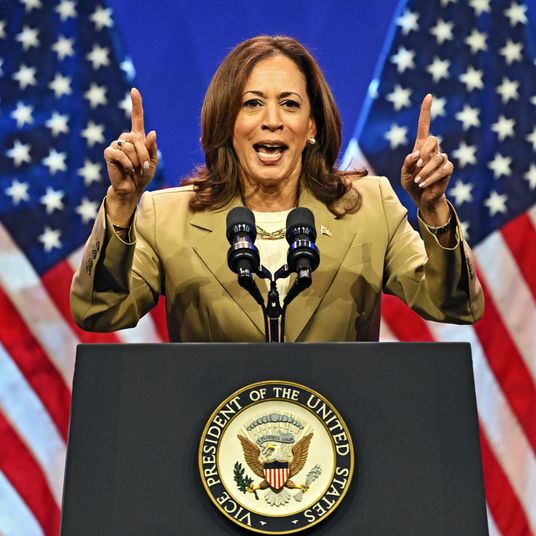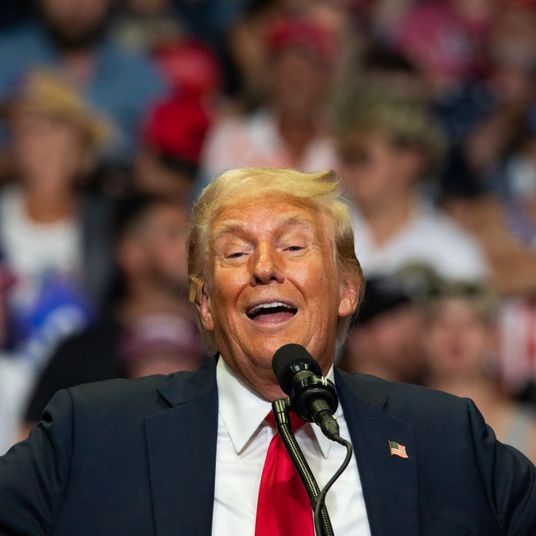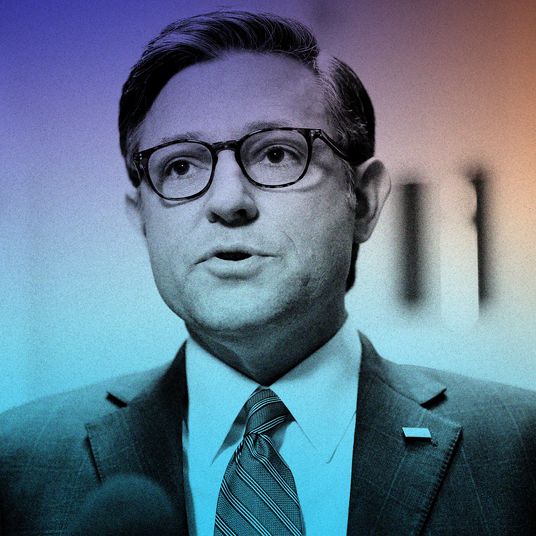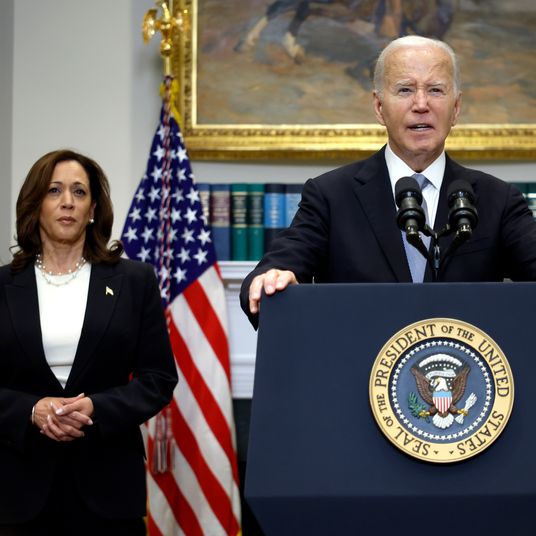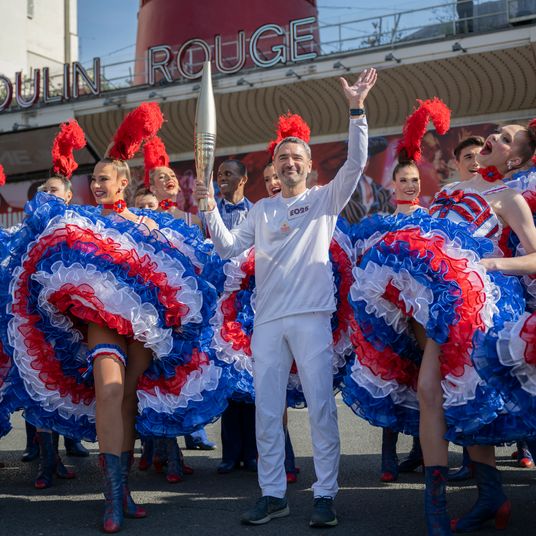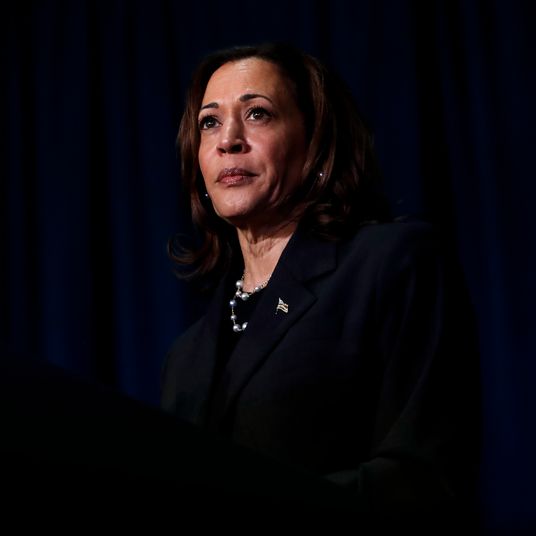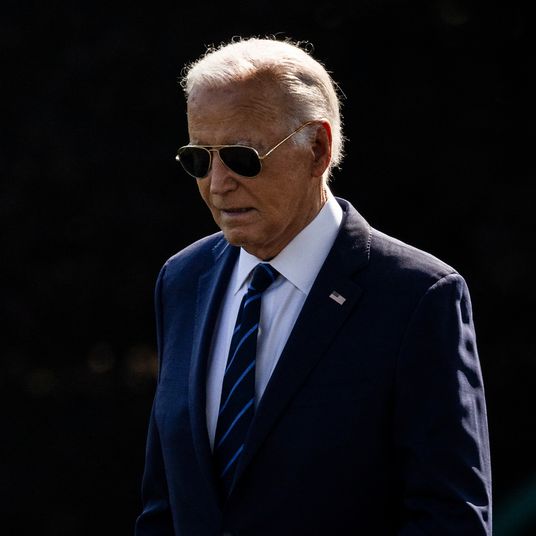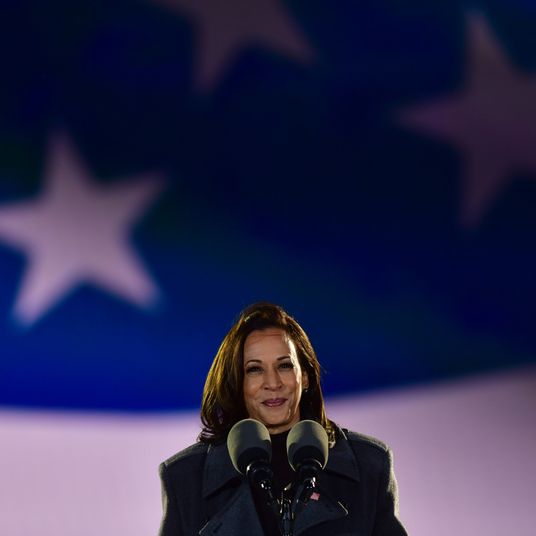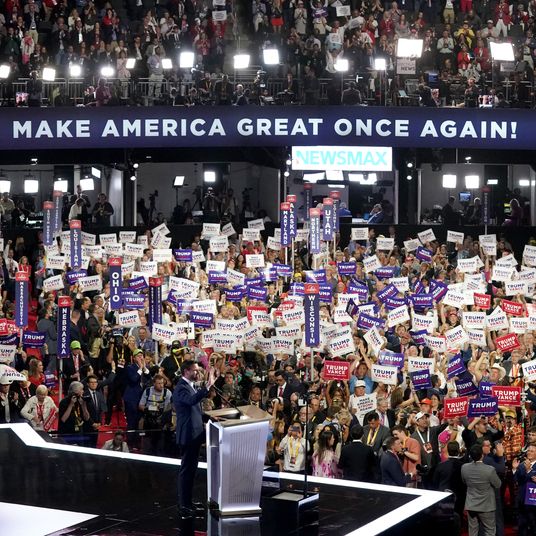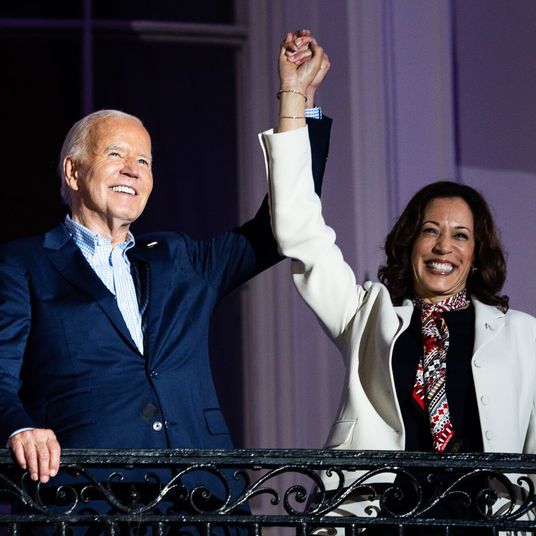
From the objective point of view of public-opinion research, Joe Biden approaches his first official State of the Union address on Tuesday night in a slough of despond. An ABC–Washington Post survey released over the weekend placed his job approval ratio at a wretched 37–55 percent, with 44 percent strongly disapproving. This is the sort of popularity level achieved by Donald Trump at his lowest ebbs, usually after some disgraceful behavior. As the Post write-up succinctly put it, the public “largely sees the economy worsening under [Biden’s] watch, disapproves of his leadership on key issues and currently prefers that Republicans control Congress after the November elections.”
But there is an important proviso to that depressing data for the 46th president: “The survey was mostly completed before the full [Russian] invasion [of Ukraine] began and the United States and others responded with sanctions.” And while there isn’t much precedent for an international crisis in which American troops are not involved significantly changing a president’s popularity, Putin’s war does give Biden a chance to change perceptions of his supposedly weak leadership, particularly if he takes full advantage of a State of the Union address likely to be widely watched and discussed in the days ahead.
Without question, Biden’s poor job-approval numbers (his current polling average is 40.7 percent at both RealClearPolitics and FiveThirtyEight) reflect dim assessments of both his international and his domestic stewardship, as FiveThirtyEight’s Nathanial Rakich explains:
In five polls conducted this month, between 52 percent and 58 percent of respondents said they disapproved of Biden’s handling of foreign policy; only 35–44 percent said they approved …
Views of how Biden is handling the Ukraine-Russia crisis weren’t that different. According to a Feb. 18–21 poll from The Associated Press/NORC Center for Public Affairs Research, Americans disapproved of Biden’s handling of “the U.S. relationship with Russia” by 56 percent to 43 percent. Meanwhile, a Feb. 1–17 Gallup poll found that Americans disapproved of his handling of “the situation with Russia” by 55 percent to 36 percent. And in a Feb. 10–14 Quinnipiac University poll, Americans disapproved of his handling of “tensions between Russia and Ukraine” by 54 percent to 34 percent.
Perceptions of Biden’s handling of world affairs took a big hit after the messy U.S. withdrawal from Afghanistan, and they haven’t recovered. But if — and this is a big if — the combination of Ukrainian resistance, U.S./European assistance, and Western sanctions on Russia continues to frustrate Vladimir Putin’s imperialist designs, and if — an even bigger if — Biden emerges as Ukraine’s best friend and Putin’s biggest nightmare, then all bets could be off, at least for a while. As Rakich notes, the latest public-opinion temperature reading, from Morning Consult, shows a possible new trajectory for Biden’s popularity:
[T]he only poll asking about Ukraine conducted entirely since Russia’s invasion so far — told a different tale. In it, registered voters gave Biden a positive net approval rating on his handling of foreign policy in Ukraine and Eastern Europe: 48 percent to 43 percent. This could reflect what will happen to Biden’s approval ratings on Ukraine (and perhaps overall) once the public hears more about the crisis and has new information on which to base their opinions — such as Biden’s televised announcement on Thursday that he would impose harsh economic sanctions on Russia and not send U.S. troops to Ukraine.
This could be the needle Biden has to thread, since Americans overwhelmingly want Ukrainian independence to survive, but without U.S. troop involvement. If that appears to be happening, even temporarily, Biden will almost certainly get some of the credit, particularly from the Democrats whose support for him has been lagging lately, and from the independents, who turned sour on his presidency some time ago. It’s also possible that the ill-disguised and sometimes openly expressed MAGA admiration for Putin could undermine the recent revival of fortunes for Republicans, who at best seem divided and irresolute over what is happening in Ukraine.
There is one distant precedent for this sort of development. In late 1979, Jimmy Carter was an unpopular president who seemed to be stumbling fecklessly across a series of domestic and international challenges. In October of that year, Carter’s job approval rating (per Gallup) was at an abysmal 29 percent. Then, in November, revolutionary students in Tehran took hostages at the U.S. embassy, and in December the Soviet Union invaded Afghanistan. Carter, who was facing what almost everyone expected to be a successful primary challenge to his renomination from liberal lion Ted Kennedy, suspended all campaign activities and channeled popular outrage at the events in distant Iran. He also imposed a grain embargo on the Soviets (later augmented by a U.S. boycott of the Summer Olympics Games in Moscow). His “Rose Garden Strategy” of exemplifying national unity and executive leadership worked wonders: His job-approval rating leaped to 58 percent by the end of January 1980, and he routed Kennedy in the early primaries, all but ensuring his renomination.
Ultimately, Carter’s handling of these twin international crises (along with wretched economic conditions) helped undo him in his general-election contest with Ronald Reagan. But initially, his self-presentation as a resolute and focused president patriotically dealing with a dangerous world succeeded.
It’s possible something of the same dynamics could benefit Joe Biden. In the long run, the war (with its impact on petroleum markets and trade and investment patterns throughout the world) may exacerbate the economic problems that are already bedeviling his administration. But in the short-term, the crisis may reboot his presidency. His self-presentation in the days just ahead, and especially in the State of the Union address, may tell the tale. In discussing the events in Ukraine, he can draw on his vast foreign-policy and national-defense experience, forged in the newly relevant Cold War and immediately post–Cold War environment. If he can reintroduce himself to a pessimistic and distracted public sick of COVID-19 and fearful of inflation as a bloodied but unbowed leader exhibiting the kind of principles his predecessor (still the de facto leader of the opposition) so notably lacks, Biden could look strong, not sleepy. That would represent still another miscalculation by Putin, who nows seems to be the stumbling, erratic president in the news.
The Latest on ukraine
- House Passes Ukraine, Israel Aid: How It Happened
- Trump’s Plan for Every Foreign-Policy Problem Is Himself
- Putin Is Winning — and He’s Flaunting It







